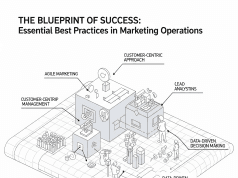In the increasingly competitive landscape of marketing technology (Martech), businesses are turning to artificial intelligence (AI) to enhance their strategies. As we dive into 2025, leveraging AI is not just an option; it’s a necessity for those looking to stay ahead. This article explores how businesses can harness AI to elevate their Martech strategies effectively.
Understanding the AI Landscape in Martech
AI is reshaping the marketing landscape by providing solutions that enable marketers to gain deeper insights into customer behavior and preferences. From predictive analytics to personalized content creation, AI technologies enhance various aspects of Martech, driving efficiency and innovation.
Key AI Technologies Transforming Martech
- Predictive Analytics: AI algorithms analyze historical data to forecast future trends. Marketers can utilize these insights to tailor campaigns to align with customer needs, optimizing conversion rates.
- Predictive Analytics: AI algorithms analyze historical data to forecast future trends. Marketers can utilize these insights to tailor campaigns to align with customer needs, optimizing conversion rates.
- Chatbots and Virtual Assistants: AI-powered chatbots enhance customer engagement and streamline service. They handle queries in real time, ensuring a seamless customer experience.
- Chatbots and Virtual Assistants: AI-powered chatbots enhance customer engagement and streamline service. They handle queries in real time, ensuring a seamless customer experience.
- Personalization Engines: AI enables hyper-personalization through segmentation and targeted campaigns based on user behavior, increasing engagement and satisfaction.
- Personalization Engines: AI enables hyper-personalization through segmentation and targeted campaigns based on user behavior, increasing engagement and satisfaction.
- Content Generation: Tools like natural language processing (NLP) can generate high-quality content, saving time and resources. Marketing teams can focus on strategy while AI handles repetitive tasks.
- Content Generation: Tools like natural language processing (NLP) can generate high-quality content, saving time and resources. Marketing teams can focus on strategy while AI handles repetitive tasks.
- Sentiment Analysis: AI tools analyze social media and customer reviews to gauge public sentiment toward brands, products, or services. This information helps in adjusting strategies in real time.
Strategies for Integrating AI into Your Martech
1. Data-Driven Decision-Making
Embrace a data-centric approach by utilizing AI algorithms to gather insights from various data sources. Implementing robust Data Management Platforms (DMPs) can aid in compiling and analyzing data, ensuring that every marketing decision is backed by actionable insights.
2. Automate Campaign Management
Utilize AI to automate email marketing campaigns and social media postings. AI tools can identify optimal send times, content types, and audience segments, maximizing engagement and conversion rates.
3. Enhance Customer Experience with AI Solutions
Integrate AI chatbots into your customer service strategy. These tools can personalize interactions and provide support 24/7. A positive customer experience often leads to increased loyalty and repeat business.
4. Invest in Training and Development
Investing in AI training for your marketing team is crucial. Understanding AI tools and their functionalities will empower your team to utilize these technologies effectively. Workshops, online courses, and seminars can enhance their skill sets.
5. Benchmarking and Continuous Improvement
Regularly assess the performance of your AI-driven strategies. Utilizing key performance indicators (KPIs) allows marketers to evaluate effectiveness and make necessary adjustments.
Real-World Applications of AI in Martech
Several companies have successfully integrated AI into their marketing strategies. For example:
- Netflix utilizes AI algorithms to personalize viewing recommendations, driving user engagement and retention.
- Amazon employs predictive analytics to anticipate customer needs, optimizing inventory and improving the shopping experience.
- Coca-Cola applies sentiment analysis to understand consumer reactions and adjust campaigns in real time.
These success stories serve as a testament to the potential of AI in reshaping marketing strategies.
Challenges and Considerations
While the benefits of AI in Martech are undeniable, businesses should also be mindful of potential challenges:
- Data Privacy: Implementing AI requires access to vast amounts of data, raising concerns about consumer privacy. Marketers must prioritize ethical data use and comply with regulations like GDPR.
- Data Privacy: Implementing AI requires access to vast amounts of data, raising concerns about consumer privacy. Marketers must prioritize ethical data use and comply with regulations like GDPR.
- Integration Complexity: Incorporating AI solutions into existing Martech stacks can be complex. A clear roadmap and well-defined integration strategies are essential.
- Integration Complexity: Incorporating AI solutions into existing Martech stacks can be complex. A clear roadmap and well-defined integration strategies are essential.
- Overreliance on AI: While AI offers substantial benefits, marketers should not rely solely on technology. Human insight and creativity remain vital for crafting compelling campaigns.
Conclusion
As we navigate through 2025, harnessing AI in your Martech strategy can significantly elevate your marketing efforts. By embracing AI technologies, marketers can enhance customer experiences, streamline operations, and make data-driven decisions. The key lies in balancing technology with creativity, ensuring that AI serves as a partner in delivering exceptional marketing outcomes. With the right approach, AI can transform your marketing strategy, propelling your brand into a new era of growth and innovation.









